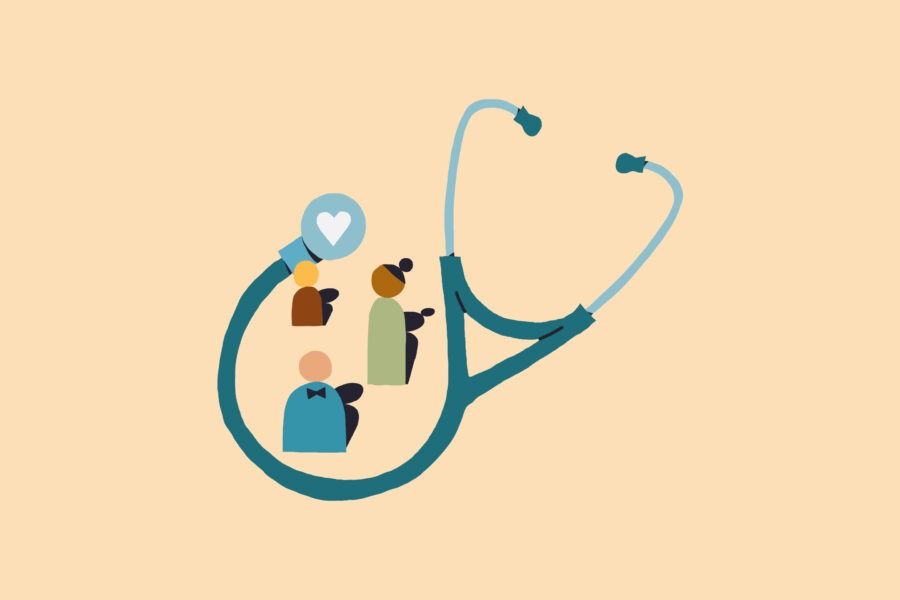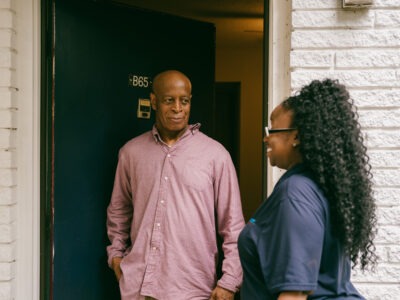Homelessness is a public health crisis. Individuals experiencing homelessness are more likely to have chronic physical and mental health conditions. In fact, as the National Health Care for the Homeless Council asserts, being unhoused “creates new health problems and exacerbates existing ones,”
Across the country, local health departments and public health agencies have embraced their role in health equity and ending homelessness, often in unique and innovative ways. These pioneering community leaders remained committed to advancing and upholding the overall health of their communities through coordinated, strategic programming that addresses the needs of their populations experiencing vulnerabilities.
To gain further insight, we reached out to experts in public health, tapping into the knowledge of professionals from organizations such as Housing for Health at the Los Angeles County Department of Health Services and the Seattle and King County Healthcare for the Homeless Network.
Read on to see what they shared about on the connection between public health and homelessness.
Responses have been edited for clarity and brevity.
What is one thing people should know about the intersection of public health and homelessness?
“Without ‘safe shelter,’ a person cannot be healthy. Safe shelter implies that the person has access to the basics- food, clothing, protection from the environment, protection from violence, and a supportive community — all essential to health and well-being. At a systemic level, without adequate safe shelter, a population cannot be healthy: ergo, the intersection of public health and homelessness.”
– Heidi Behforouz, MD, Chief Medical Officer, Housing For Health, LA County Department of Health Services
“One thing people should know about the intersection of public health and homelessness is that homelessness exacerbates health disparities, and health disparities increase the chances that someone experiences homelessness. Homeless individuals face increased vulnerability to infectious diseases, mental health issues, substance use issues, and chronic conditions due to limited access to health care, unstable living conditions, and exposure to harsh environmental factors. Addressing homelessness is integral to achieving better public health outcomes for all.”
– Dr. Howard K. Koh, MD, MPH, Harvey V. Fineberg Professor of the Practice of Public Health Leadership and Inaugural Faculty Chair of the Initiative on Health and Homelessness at the Harvard T.H. Chan School of Public Health
– Emily E. Lazowy, MA, Program Manager for the Initiative on Health and Homelessness at the Harvard T.H. Chan School of Public Health
“Housing is a crucial social determinant of health. By recognizing the interplay between housing and health, communities can work towards providing comprehensive support and improving the well-being of vulnerable populations. According to the National Health Care for Homelessness Council – persons experiencing homelessness (PEH) have higher rates of illness and experience mortality rates 3-4 times higher than the general population.
People experiencing homelessness also are:
- 3-4 times more likely to die prematurely
- 2 times as likely to have a heart attack or stroke
- 3 times more likely to die of heart disease if they are between 25 and 44 years old
- experience an average life expectancy of 48 years
It is also important to note that experiencing physical or mental illness or injury can lead to homelessness.
- An injury or illness can start out as a health condition but can lead to loss of employment.
- Medical debt is the leading cause of personal bankruptcy filing in the U.S.
- More than 20% of Americans between 19 and 64 years old struggle to pay their medical bills.
- At least 25% of people experiencing homelessness have a serious mental illness, such as schizophrenia, bipolar disorder, post-traumatic stress disorder, or major depression.
- A majority of these individuals also deal with addiction.
- Drug-, alcohol-, injury-, and mental health/psychiatric-related diagnoses are the most common reasons a people experiencing homelessness presents to the Emergency Department.”
Reference 1-5: Homelessness makes you sick. (2020, January 22). Health Care for the Homeless – Baltimore and Maryland.
– Trish Franco, Master of Social Work, Public Health Specialist, Alaska State Division of Public Health’s Homelessness Health Intervention and Prevention Unit
“The great thing about public health is that it — by definition — gives us the road map to understanding and addressing structural determinants of health, housing, and well-being, as well as inequities. It does and always has. A solid grounding in public health principles and methods can guarantee, as a point of departure, the common good, through shared conceptual and very pragmatic ways that can be guided by and held accountable by data that demonstrate effect.”
– Jennifer L. Metzler, MPH, Chief Executive Officer, Albuquerque Health Care for the Homeless, Inc.
“People experiencing homelessness need system change and services to help them protect their health. This not only means addressing the root causes of housing insecurity – economic, social, educational, safety – that push people into homelessness and poor health. It also means recognizing the longer people experience homelessness and have inconsistent access to medical care, the more their health and well-being will deteriorate.
Data shows people experiencing homelessness have a higher burden of illness, including chronic disease, infectious disease, and behavioral health conditions, than the general population. Data also shows people of color, especially Black/African American and Indigenous communities, experience homelessness at higher rates than white communities due to long-standing structural barriers.”
– Healthcare for the Homeless Network, Public Health – Seattle and King County (PHSKC)
Why do you think homelessness is a public health issue?
“Renowned public health leader CEA Winslow defines public health as ‘the science and art of preventing disease, prolonging life, and promoting health through the organized efforts and informed choices of society, organizations, public and private communities, and individuals.’
We have more than proven that safe shelter is critical to the promotion of health and the prevention of disease and injury. A civil society that equitably defends its public’s health, therefore, must provide affordable and high-quality housing with unfettered access to necessary health and social services.”
– Heidi Behforouz, MD, Chief Medical Officer, Housing For Health, LA County Department of Health Services
“Homelessness is a public health issue because it magnifies health risks and strains health care systems. Individuals experiencing homelessness often lack access to basic hygiene, nutrition, and medical care, leading to higher rates of illness and untreated conditions. Homelessness not only affects the well-being of those directly impacted but also poses broader societal health challenges, requiring comprehensive strategies for prevention and intervention.”
– Dr. Howard K. Koh, MD, MPH, Harvey V. Fineberg Professor of the Practice of Public Health Leadership and Inaugural Faculty Chair of the Initiative on Health and Homelessness at the Harvard T.H. Chan School of Public Health
– Emily E. Lazowy, MA, Program Manager for the Initiative on Health and Homelessness at the Harvard T.H. Chan School of Public Health
“People experiencing homelessness (PEH) often face barriers to accessing health care, resulting in higher rates of chronic illnesses, infectious diseases, and mental health disorders — this has consequences across the health care and social service sector and it has ripple effects throughout communities.
For example, people experiencing homelessness often have limited access to preventative and primary health care, which can lead to:
- Delayed diagnosis and treatment of medical conditions, which means higher costs for more difficult treatments, higher utilization of emergency services, etc.
- Worsening pre-existing medical conditions — again, higher cost burdens on the Medicaid system, higher burden on Emergency Departments, etc.
- Higher risk of contracting and/or spreading infectious disease (TB, Hepatitis, Syphilis, HIV). This is an obvious public health issue; it’s also an issue to take very seriously for those among the PEH population who are pregnant or who have some other medical vulnerability.
When thinking about winter in Alaska, we must also consider how a lack of consistent shelter exposes homeless individuals to harsh weather conditions and an increased risk of hypothermia and cold-related injuries.”
– Trish Franco, Master of Social Work, Public Health Specialist, Alaska State Division of Public Health’s Homelessness Health Intervention and Prevention Unit
“Communities too often focus on individuals and pathologizing and/or criminalizing people experiencing homelessness and their circumstances. Even the most well-intentioned people just want to ‘do something’ immediately to help, but it’s not enough. A public health approach recognizes the dialectic between very broken structures and personal vulnerabilities that put some people (way too many people) at greater risk of falling into homelessness.”
– Jennifer L. Metzler, MPH, Chief Executive Officer, Albuquerque Health Care for the Homeless, Inc.
Public Health – Seattle and King County operates using trauma-informed practices to improve the health and well-being of people living homeless. Additionally, we inform policy and systems change to promote health among people living homeless. We recognize improving health depends on addressing underlying social determinants related to economics, education, and safety.
Our organization promotes physical and behavioral health by providing health education materials designed for people living homeless, along with preventive care like routine exams and cancer screening through our Healthcare for the Homeless network.
To provide treatment for people experiencing homelessness, we bring health care teams to streets, encampments, shelters and supportive housing. We also work to support the behavioral health needs of our community members through outreach and education, improving access to overdose prevention medications, and needle exchange programs.
– Healthcare for the Homeless Network, Public Health – Seattle and King County (PHSKC)
What’s one promising development you’re looking forward to in 2024 across the public health and homelessness sectors?
“Fentanyl overdose is the lead driver of mortality among unsheltered Angelenos. To address this growing public health crisis among people experiencing homelessness, Los Angeles County is increasing the construction of permanent supportive housing units to bring people inside, as well as rethinking the scope and intensity of wrap-around, harm-reduction services.
Some of these services should include increased access to medications for addiction treatment, safe consumption sites, and peers with lived experience who accompany their clients on their journey to life recovery.”
– Heidi Behforouz, MD, Chief Medical Officer, Housing For Health, LA County Department of Health Services
“One encouraging prospect we anticipate in 2024 is the advancement of innovative permanent supportive housing models. These initiatives prioritize offering stable housing coupled with comprehensive support services. As communities embrace and invest in these models, we can expect significant strides in reducing homelessness and positively impacting public health by addressing the root causes of homelessness and health disparities.”
– Dr. Howard K. Koh, MD, MPH, Harvey V. Fineberg Professor of the Practice of Public Health Leadership and Inaugural Faculty Chair of the Initiative on Health and Homelessness at the Harvard T.H. Chan School of Public Health
– Emily E. Lazowy, MA, Program Manager for the Initiative on Health and Homelessness at the Harvard T.H. Chan School of Public Health
“I’m really excited about the potential for data sharing between homeless service providers and health care service providers. I see great examples of this popping up around the country right now, and I think helping providers who are serving the same clients better coordinate and collaborate is a win-win for providers and clients alike.
I think it’s important to examine the impact of high service utilizers on hospitals and the local health care systems and to use data to exemplify the need for increased investment in permanent supportive housing, medical respite, complex care facilities, assisted living facilities, affordable housing, etc.
Using data sharing to help identify the highest utilizers within the health care and homeless service sectors allows us to prioritize those who are most vulnerable and improve coordination and collaboration between providers. This will improve outcomes for clients and help us better understand the complexities of the medical and social needs of people experiencing homelessness. And it allows for us to make the case for housing interventions by analyzing health care utilization costs versus the cost of housing and social service interventions.”
– Trish Franco, Master of Social Work, Public Health Specialist, Alaska State Division of Public Health’s Homelessness Health Intervention and Prevention Unit
“With a shared set of strategies within a public health lens, we can have a greater and more sustainable impact on ending homelessness. That potential to opt together to tap into our collective agency as a community and turn around what ails us and leaves people on the streets is what excites me in 2024.”
– Jennifer L. Metzler, MPH, Chief Executive Officer, Albuquerque Health Care for the Homeless, Inc.
“We’re looking forward to the continued work of Healthcare for the Homeless in reaching people experiencing homelessness who are outside of the traditional shelter and housing system, including refugee and immigrant community members.”
Learn more: Public Health’s Role at the Intersection of Health and Homelessness – King County, Washington




